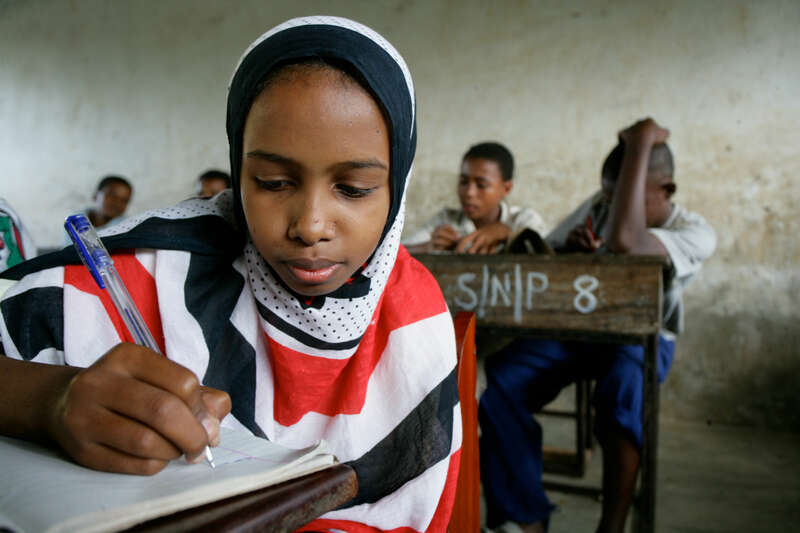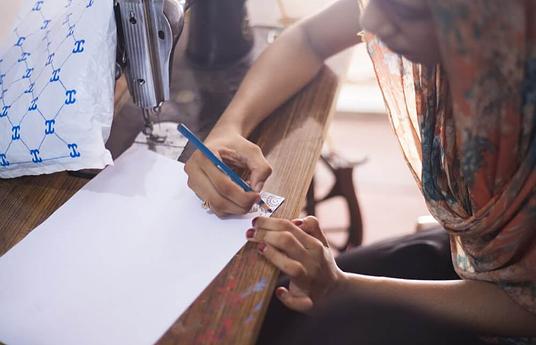Aflatoun International creates high-quality curricula on social and financial education for different age groups. Their mission is to socially and economically empower children and young people so they can act as agents of change in their own lives for a more equitable world. They create curricula around social and financial education for children and young people of different age groups to learn about their rights, how to save and budget their money, and how to start small enterprises.
Aflatoun International has been selected for both the HundrED 2021 Global Collection and the Financial Skills for Youth Spotlight Report. When reviewing Aflatoun for impact and scalability on Academy Member wrote, "Education is meant to prepare children for the future and Aflatoun International innovation on financial education is just doing that. It's a wonderful innovation indeed as it gives exactly what is required to build a business mindset."
In March of this year, Aflatoun and its partners organized a series of calls with children and young people from more than 40 countries in Africa, Asia, Europe, the Middle East and the Americas. The youth openly spoke about how the COVID-19 pandemic affected their lives and shared their coping mechanisms. Below you will find a synthesis of that conversation.
Children are losing a sense of future
Children are not happy. Every girl and boy participating in the discussions, from Colombia to Ghana, to the Philippines, felt the consequences of the pandemic in their daily life.
They all miss their friends and find that the most difficult part is not being able to go to school. Switching to online learning has not been easy: many households do not have access to the internet, and many do not have devices to access online learning materials.
“When the schools closed, we started studying at home. But some classes are difficult to study alone. I am sad that we missed many opportunities to learn and socialise with our friends. I have not seen my friends for months.” – Ishara from Sri Lanka.
“One of the greatest challenges for me was the schools’ closure. Many young people in El Salvador do not have digital means to continue virtual education. In my case, my family cannot afford to have digital materials that would allow me to study online. Gladly, thanks to the Foundation [Fundación Gloria de Kriete]and other people who helped me I could continue learning. In Salvador, there are many children who do not have resources to study online.” – Leslie from El Salvador.
Children from the Philippines mentioned a slow internet connection. Showing that simply having access to learning devices is not enough; in order to ensure quality online learning, internet access must also be ensured.
Additionally, the pandemic took its toll on children’s mental health. Even though almost every young person mentioned that the lockdown was a great time to connect with their families, it majorly affected their mental well-being.
“The confinement was very difficult for me. The restraints from not being able to do the activities that make me happy, honestly, had serious effects on my mental health. Everything stopped. We were forced to stay at home, we had very little to do, and on top of that, we had absolutely no assurances or hope in our future. This was in addition to all the general health-related stresses of the pandemic. It was very stressful for us young people.” – Gabriele from Burkina Faso.
“The pandemic has been very hard. We could not do many things together with our friends. For example, we could not see them, play with them or be around them, so it is hard to live a normal life.” – Harawobadi from Ghana.
Children are calling for practical solutions
During the calls, we also asked children what are they expecting from their governments, community leaders, schools, and teachers to help them overcome the challenges they encountered during the pandemic. The answers were very clear and sensible: they want schools to be open, they ask for better means to access quality online learning, they ask for support to reduce their anxiety and they are pleading for jobs and/or financial support for their parents/caregivers.
Open schools – An interesting insight came from the call between young people from Armenia, Ethiopia and Zimbabwe. Students from poor families could not afford to have the necessary digital devices to attend online lessons. If they could ask one thing from their presidents it would be to open the schools and not go back to online classes.
“We understand the fact that measures have to be respected in order for people’s health to be protected, but the distanced learning was not equivalent to the quality of education we got at school. We are concerned that this will have an impact on our futures. We want the government to do more to ensure that there are adequate support and quality control of education because learning from home did not fulfil our educational needs.” – Aka from Mali
Digital means – Recognising that some government leaders do not currently consider opening schools as an option, children and youth asked for digital means and access to the internet in order to continue learning. This could be through providing devices to children who do not have them in their households or through community centres with access to computers.
“I think the decision-makers should consider that in some households they only have one device for four or five people to connect to their classes. They could give them gadgets so everyone in a household can connect.” – Luis from Guatemala.
“To face Covid-19, we need a stronger internet connection and basic social services like electricity and water, as those are very weak in Yemen.” – Ismail from Yemen.
“I would ask to make some community centres, where they would lend computers to do homework, with good internet access and to be a centre for socialisation. We completely isolated ourselves in our homes and don’t talk to anyone. For those of us who are not in the city, the internet does not work well.” – Regina from Mexico.
Mental health support – Child and adolescent mental health have been profoundly exacerbated by the pandemic. They explained that the pandemic has brought many uncertainties to them, their friends and their families. With daily updates about the virus and lockdowns dominating media channels around the world, people’s mental health has been negatively affected as a result of being overexposed to somber news. During all our sessions young people asked for special counselling sessions or mentorship to overcome the challenges brought by the pandemic.
“I would ask them [the local government] to better guarantee the mental health of students since not all of us can face situations in the same way. There are young people who have had a harder time adapting to this reality.” – Violeta from El Salvador
“We would ask the local community to organise communal entertaining and educative activities while respecting the social distancing regulations like our activities in our Aflatoun Club.” – Aflatoun club student from Tunisia
Financial support for their families – Children also voiced concerns over the financial situation in their families. Many parents lost their jobs during the pandemic, and some children on the calls lost members of their families due to the coronavirus. Because in many countries there are (formal or informal) fees to access education, students asked for scholarships or waiving of fees to support their education. They also asked for help from their parents who lost their sources of income and find them jobs.
“I would like to ask the President to make more changes to student finance. For example, that in all schools in Colombia we can go to school and learn how to save, and how to manage expenses. And also make better investments in students’ finances.” – Alison from Colombia.
Looking forward – Building a future
As the pandemic continues, students are asking their government leaders and other decision-makers to listen to them and address their needs and those of their families. What they are asking for is very reasonable. They are demanding their right to access quality and relevant education, they are asking for help to reduce their anxiety, and they are asking for help in taking care of the finances of their parents and caregivers.
The children are pleading to governments, international organisations, NGOs, community leaders, schools, teachers to collaborate and cooperate in order to make sure that their future continuous today!
Aflatoun and its partners will intensify their efforts to provide children and young people with the knowledge and skills to build resiliency and improve their lives. Let’s all work together to assist them with their straightforward requests, let’s help them prepare for a hopeful future now!
“Being at home for so many months felt constricting since people of my age could not do things we were used to doing before. During the whole time, I was thinking about when this pandemic would end. Looking at it now, I would say that this pandemic is not an easy fight. And it is not only a fight within us but a fight for all people around the globe. As we see the pandemic from different perspectives in different countries, everything could end with one thought, that if we work together and fight this pandemic as one, we can indeed heal from it.” – Aiman from the Philippines.
Let’s work together, as Aiman said, to Share, Inspire, Empower!
Learn more about Aflatoun International






